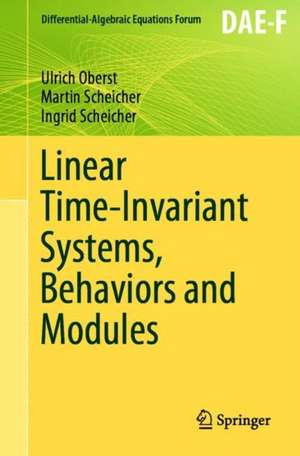Linear Time-Invariant Systems, Behaviors and Modules: Differential-Algebraic Equations Forum
Autor Ulrich Oberst, Martin Scheicher, Ingrid Scheicheren Limba Engleză Paperback – 28 iun 2020
Preț: 606.82 lei
Preț vechi: 713.91 lei
-15% Nou
Puncte Express: 910
Preț estimativ în valută:
116.11€ • 121.56$ • 96.08£
116.11€ • 121.56$ • 96.08£
Carte tipărită la comandă
Livrare economică 07-21 aprilie
Preluare comenzi: 021 569.72.76
Specificații
ISBN-13: 9783030439354
ISBN-10: 3030439356
Pagini: 750
Ilustrații: XI, 750 p. 14 illus.
Dimensiuni: 155 x 235 mm
Greutate: 1.05 kg
Ediția:1st ed. 2020
Editura: Springer International Publishing
Colecția Springer
Seria Differential-Algebraic Equations Forum
Locul publicării:Cham, Switzerland
ISBN-10: 3030439356
Pagini: 750
Ilustrații: XI, 750 p. 14 illus.
Dimensiuni: 155 x 235 mm
Greutate: 1.05 kg
Ediția:1st ed. 2020
Editura: Springer International Publishing
Colecția Springer
Seria Differential-Algebraic Equations Forum
Locul publicării:Cham, Switzerland
Cuprins
1. A Survey of the Book's Content.- 2. The Language and Fundamental Properties of Behaviors.- 3. Observability, Autonomy and Controllability of Behaviors.- 4. Applications of the Chinese Remainder Theorem.- 5. Input/ Output Behaviors.- 6. Interconnections of Input/ Output Behaviors.- 7. The Transfer Matrix as Operator or Input/ Output Map.- 8. Stability via Quotient Modules.- 9. Compensators.- 10. Observers.- 11. Canonical State Space Realizations.- 12. Generalized Fractional Calculus.
Recenzii
“This 700-plus page book provides a multifaceted introduction to linear time-invariant (LTI) systems theory, both for continuous-time and discrete-time. … In my view, this book is interesting and can be helpful to students and researchers interested in LTI systems theory.” (Jin Liang, zbMATH 1478.93003, 2022)
Notă biografică
ULRICH OBERST is Professor Emeritus at the University of Innsbruck, Austria. Earlier, he was professor of mathematics at the same university from 1972–2009. He completed his Ph.D. in Mathematics from the University of Munich, Germany, in 1965, under the guidance of Prof. F. Kasch who, in particular, taught injective co-generators—a notion from homological algebra which plays an important part in the present book. He has visited a number of universities in several countries on invitations, including Pennsylvania State University, USA, University of California San Diego, USA, University of Chicago, USA, University of Florida, USA, and University of Rome II, Italy. His areas of interest include algebra and applied mathematics with special emphasis on constructive methods, in particular multidimensional linear systems theory and discrete Gelfand, Fourier and Hartley transforms. A father of two and grandfather of six, Prof. Oberst is happily married to Karla. He is also an experienced piano player and has participated in two chamber music ensembles, playing piano trios, quartets and quintets with, in particular, string players from the Tyrolean Symphony Orchestra Innsbruck.
Textul de pe ultima copertă
This book comprehensively examines various significant aspects of linear time-invariant systems theory, both for continuous-time and discrete-time. Using a number of new mathematical methods it provides complete and exact proofs of all the systems theoretic and electrical engineering results, as well as important results and algorithms demonstrated with nontrivial computer examples. The book is intended for readers who have completed the first two years of a university mathematics course. All further mathematical results required are proven in the book.
Caracteristici
Provides a comprehensive survey of significant aspects of linear time-invariant systems theory Presents new methods to obtain complete and exact proofs of results Features results accompanied by constructive algorithms that are demonstrated by nontrivial computer examples









